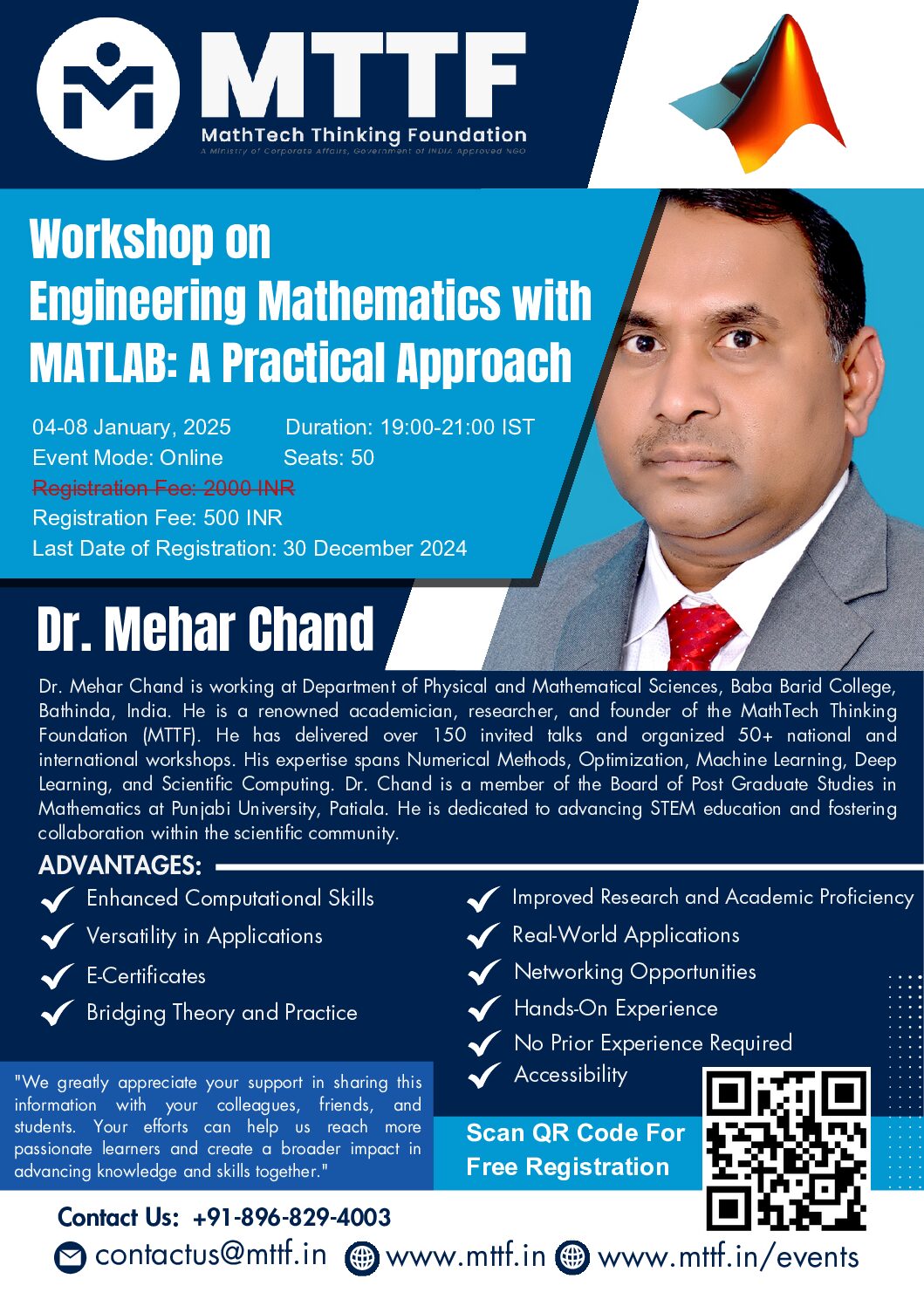Workshop on Engineering Mathematics with MATLAB: A Practical Approach

- Event Date: 04-08 January, 2025
- Duration: 19:00-21:00 IST
- Event Mode: Online Seats: 100
- Registration Fee: 500 INR
- Last Date of Registration: 04 January 2025
- Enjoy a 30% Discount with the coupon code: NEWY2025. Hurry! Only 50 coupons are available, and they’re valid for today only!
Target Audience
- Engineering Students: Particularly those in their undergraduate or postgraduate studies.
- Faculty Members: Those looking to integrate MATLAB into their curriculum.
- Industry Professionals: Engineers seeking to improve their computational tools and mathematical modeling skills.
Workshop Objectives
The objective of the Workshop on Engineering Mathematics with MATLAB: A Practical Approach is to provide participants with a hands-on learning experience in using MATLAB for solving engineering mathematics problems. It aims to bridge the gap between theoretical concepts and practical applications. The workshop will focus on numerical methods, optimization, differential equations, and data visualization in MATLAB. Participants will learn to apply these techniques to real-world engineering challenges. By the end of the workshop, attendees will be proficient in utilizing MATLAB for academic, research, and professional purposes.
Why MATLAB?
MATLAB is widely used for mathematical modeling, simulations, and problem-solving in engineering because it provides a robust platform with a range of powerful built-in functions. It is especially useful for solving complex mathematical problems quickly and efficiently, making it a valuable tool for engineers and scientists.
Organizational Goals
- Foster innovation and excellence in STEM education and research through collaborative initiatives and skill-building programs.
- Promote the practical application of advanced technologies and mathematical methods in solving real-world engineering challenges.
- Create a supportive community for professionals, scholars, and students, encouraging lifelong learning and cross-disciplinary collaboration.
Why MATLAB for Engineering Mathematics?
MATLAB is an ideal tool for Engineering Mathematics because:
- Powerful Computational Capabilities: MATLAB provides a wide range of built-in functions and toolboxes to solve complex mathematical problems in linear algebra, calculus, differential equations, optimization, and more, making it efficient for engineering applications.
- Ease of Use and Flexibility: MATLAB’s user-friendly environment allows engineers and researchers to quickly write code, perform simulations, and visualize results. Its interactive nature enables rapid prototyping and experimentation.
- Visualization and Graphing: MATLAB excels in data visualization, allowing users to plot functions, simulate dynamic systems, and display results in 2D and 3D formats, which is crucial for understanding and presenting engineering problems and solutions.
- Extensive Support and Documentation: With its vast user community and comprehensive documentation, MATLAB offers ample resources for both beginners and advanced users, making it easier to troubleshoot and learn new techniques.
- Integration with Other Tools: MATLAB can integrate with other software, databases, and hardware, allowing for a seamless workflow in engineering projects that require multi-disciplinary collaboration and data sharing.
Content Targeted
1. Introduction to Engineering Mathematics and MATLAB
- Overview of Engineering Mathematics in various fields of engineering.
- Importance of computational tools in solving complex mathematical problems.
- Introduction to MATLAB: Features and capabilities for engineering applications.
- MATLAB interface and environment overview.
2. MATLAB Basics
- MATLAB Workspace and Command Window.
- Creating and manipulating variables: Scalars, vectors, matrices, and arrays.
- MATLAB data types and structures (cell arrays, structs).
- Basic mathematical operations and functions in MATLAB.
- Plotting in MATLAB: 2D and 3D plots, customization.
3. Linear Algebra with MATLAB
- Matrix operations: Addition, multiplication, inversion, and transposition.
- Solving systems of linear equations using MATLAB.
- Eigenvalues and eigenvectors: Computing and applications in engineering.
- Applications in structural analysis and electrical circuits.
4. Calculus in Engineering Mathematics
- Numerical differentiation and integration in MATLAB.
- Applications in signal processing and control systems.
- Symbolic computation using MATLAB’s Symbolic Math Toolbox.
- Solving engineering problems related to rate of change, area, and volume.
5. Ordinary Differential Equations (ODEs)
- Introduction to ODEs and their importance in engineering.
- Solving ODEs using MATLAB (ODE solver functions like
ode45,ode23). - Practical examples: Modeling dynamic systems, mechanical vibrations, and electrical circuits.
- Visualizing ODE solutions using MATLAB’s plotting tools.
6. Partial Differential Equations (PDEs)
- Introduction to PDEs and their relevance in heat transfer, fluid dynamics, and wave propagation.
- Solving PDEs numerically using MATLAB and MATLAB toolboxes.
- Case studies: Heat conduction, fluid flow simulations.
7. Optimization Techniques in MATLAB
- Introduction to optimization problems: Linear and nonlinear optimization.
- Solving optimization problems using MATLAB’s optimization toolbox.
- Applications in engineering design, such as minimizing cost or maximizing efficiency.
8. Control Systems Analysis and Design
- Introduction to control systems and their mathematical models.
- MATLAB tools for analyzing system stability (Bode plots, Root Locus).
- Designing controllers (PID control, state-space representation).
- Simulating dynamic behavior of control systems in MATLAB.
9. Signal Processing and Fourier Analysis
- Basic principles of signal processing in engineering.
- MATLAB functions for filtering, signal analysis, and Fourier transforms.
- Practical applications in communication systems, audio processing, and vibration analysis.
10. Case Studies and Applications
- Practical engineering problems solved using MATLAB.
- Modeling physical systems and simulating real-world scenarios.
- Optimization and system design applications in structural, electrical, and mechanical engineering.
